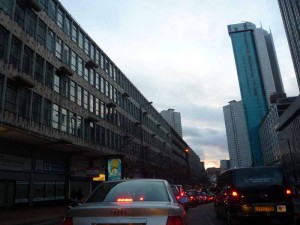The Sanitised City: How public is public space?
Wednesday 8 February
The Studio, Cannon St, Birmingham B2 5EP. 7.00pm until 8.30pm and in the pub afterwards.
 For all the talk of reigning back the state, binning red tape, and letting the Big Society emerge, the explosion of rules and regulations, bans and behavioural codes, shows no sign of abating under the Coalition. The securitised, commercialised and homogenised centres that dominate British cities have been to the fore in the urban discussion in recent years.
For all the talk of reigning back the state, binning red tape, and letting the Big Society emerge, the explosion of rules and regulations, bans and behavioural codes, shows no sign of abating under the Coalition. The securitised, commercialised and homogenised centres that dominate British cities have been to the fore in the urban discussion in recent years.
Privatisation, in the form of shopping malls or managed developments such as Brindley Place, are said to create ‘pseudo public spaces’, what one commentator describes as ‘pacification by cappuccino’; others point to the eviction notices pinned to tents outside St Paul’s Cathedral as showing that the interests of the Corporation prevail over the freedom of the people.
But is this picture overly simplistic? After all, six out of ten people would like to see more CCTV cameras in their local area, suggesting support for the idea that the private space of the individual should be opened up to greater public scrutiny. Where public space might once have operated on the basis of trust, today suspicion of the autonomous citizen seems to have become acceptable – and even encouraged. Behaving responsibly – no loitering, no drinking, no leafleting, no photography – is often justified on the grounds of safeguarding the public from unsolicited attention or interaction.
So what could bring our sanitised cities back to life? What represents acceptable behaviour, and who should decide and how? Is the way forward to be found in better design and new models of ownership? As from Cairo to Tunis and from Athens to Madrid, civic space has recently been thrust back into the spotlight. This session asks, How public is public space?
Introduced by Alastair Donald who is associate director of the Future Cities Project, and co-editor of The Lure of the City: From Slums to Suburbs (Pluto 2011). He is also an urban designer, researching mobility and space at the Martin Centre for Architectural and Urban Studies, University of Cambridge.
Nikki Pugh works in the grey areas between and across Art, Science and Technology. She is primarily interested in issues around interaction: how we interact with spaces and landscapes and, in supporting exploration and criticism. She is co-author of the ‘Splacist Manifesto’.
All Welcome
£5 on the door (waged) or a donation of your choice if you’re not.
Information from The Birmingham Salon website – A public forum for debate where ideas are vigorously scrutinised and no topic is off limits.


